- Home
- Adele Griffin
Picture the Dead Page 10
Picture the Dead Read online
Page 10
He stops walking, his posture losing some of its starch as his fingers press the temple of his bad eye. I can almost feel it throb myself.
“We did fight at the Wilderness, back in May,” he supplies. “All of us Dearborn, too. Dearborn was brazen but not a bad sort. But we lost more than half our company in Virginia, and it changed us. We were in a strange country, with death and horror all around. Soldiers stole food and bullets, fought with their fists, with knives it wasn’t long that some men of the company began to make alliances. It’s one way to protect yourself. Watching one man’s back and hoping he’ll have yours. Will and Dearborn were thick. What happened after the two of them were captured I can’t say firsthand. We got separated and I continued on to Savannah.”
“Where you were wounded.”
“Yes.” He touches his eye reflexively. “Through runners, I learned Will and Dearborn had fallen in with another fellow, Charles Curtis.”
“That name is familiar. It was in the letter.”
“Curtis made the newspapers, too, though it wasn’t much reported it didn’t put us Yanks in so pretty a light. I have an article I can show you. Curtis spearheaded a gang of prisoners that called themselves Curtis’s Raiders. A brutal bunch with murder in their hearts. I heard of one Raider who killed his own brother for a few dollars. Hid the corpse in a ditch and slept on top to hide the bones. Honest prisoners fought Raiders every day a war inside a war till orders came in from a Confederate general to get it stopped.”
“You are telling me that…?”
“Yes, Jennie. Will was a Raider.”
“‘One broken neck, an example to others,’” I repeat the words of Will’s letter.
“Six broken necks,” Quinn corrects. “There was a trial in July. Where six men were hanged, including Curtis and Will. Somehow Dearborn paid off a jailer and escaped. Well, except they got him in the end.”
In my mind’s eye I see Will, steadfast in his military brass and buttons. The clean scent of Pears soap on his skin as he held me close and whispered his love, promising his heart and his safe return. My image is awash in light and hope and resists the shadow that is falling over it; that of a confused young man, ill prepared for the trials and darkness of war. Disenchanted, exhausted, witness to slaughter, and then a murderer himself. Did I ever know this Will? Do I sense him in the worried tug and rattle of my disturbed senses, as I try to press on without him?
Our conversation has drained us both. I sense that Quinn has retreated from me.
We walk until the roof of Pritchett House is visible beyond the trees. I hate the house on sight. Hate its monolithic walls and windows. If only I could have predicted what sorrows awaited me, I’d have fought like a dog before I passed through its doors.
“You were right, I should leave,” I tell him. “There’s nothing for me here.”
I can’t continue. Not one more step. But Quinn has stayed on my elbow.
“That’s not true,” he says, and the catch in his voice makes me look up. “I didn’t kiss you back there to hush you, Jennie. I kissed you to be heard. I’ve wanted you to leave here for selfish reasons. My brother didn’t deserve his death, but he didn’t deserve you either.”
Quinn’s hand catches my fingers, which are so cold that it is only a pressure. I pause a moment, but when I step forward he pulls me in so tight his arms near wrap double around the small of my back. He falls against my body, and my hands slip around his neck as his head sinks to find purchase on my shoulder. The weight of his unburdening nearly crushes me. “I’ll look after you now, Fleur,” he whispers. “I promise. I will. If you think you can look after me?”
His flinted face is a map I’ve known since childhood. And yet my eyes have never traveled it so intently. Toby and I always thought that it was Quinn who was the cold one, holding himself apart from us. We judged him swiftly, as children do, without wisdom or compassion. Now I stare at this young man who has endured so much and has asked so little. Quinn’s eyes are incandescent, guarded but hopeful.
“Of course I will, Quinn,” I tell him. “You’re all I have.”
23.
We’d each left the house that morning alone, weighted by our private afflictions. Fingers laced and feet in step, we return to Pritchett House together. We have made a promise to each other, and our bond needs to be as strong as the stone and mortar that holds us here.
In a first act of faith, Quinn begins to collapse his smokescreens for me. He is relieved to show me the few articles on the Raiders that he has folded into brittle squares and slipped into the pages of his books. I secret one away for my scrapbook before advising him what to do with the rest.
“Dispose of these,” I advise, and though I sense he cannot, I do have his ear on many other aspects of the household.
“You should take Mrs. Sullivan’s key ring” is my first practical suggestion. “As long as she guards our cellar and larder, it is difficult to take inventory.”
“That seems wise.” And not a day later he presents me with the keys like a waggling retriever who has fetched a stick. It is not his only gift to me. One day I find a box of chocolate-covered almonds in my knitting basket. The next day it’s a silky hair ribbon on my dresser. On my pillow that night is a poem clipped from the Atlantic Monthly, with a nosegay. Such devoted attentions and such a wealth of consideration after so little are an unbridled pleasure.
Still, the moments I wait for are not made of flowers and chocolates but our stolen, heated moments in the hall and at the banister, behind the library door, and once in the scullery, when Quinn sweeps me up so that only the tips of my toes touch the ground. His mouth hungry on mine as if seeking something extra, hidden, and secret, past my lips, my name whispered like some kind of elixir. What I had thought was arrogance I now know to be nothing but reserve, and not even much of that anymore.
“You won’t leave me, will you, Fleur?” He often speaks this refrain into my ear as he presses against me.
“Never,” I whisper back, so sure in my answer that I don’t know why he continues to doubt and to ask.
I am no longer a spy. Toby’s ghostly instructions were nothing but my own childish whims. I don’t even care when Mavis shyly reports that she saw us kissing in the corridor.
“See? You’ll be the Missus of the house yet, just as I always said,” she declares. “Though I’m sorry to lose your company, Miss Jennie, it’s the right order of things.”
“As long as Mrs. Sullivan isn’t boxing your ears. Now that I’ve got her precious keys, she’s been in a foul temper.”
Mavis shrugs, and I know that some things haven’t changed.
To my face Mrs. Sullivan is all sullen deference. Re-affixing the Miss to my name and not so quick to serve me the burnt bits of toast or end pieces of meat. But I know that the housekeeper’s resentment brews and that Mavis takes the brunt. There is nothing I can do. As long as Aunt Clara wields the official title of Mrs. Pritchett, Mrs. Sullivan’s position here is all but guaranteed.
But I am gaining strength.
I put my past behind me. I salve my hands with cream twice a day to soften my calluses. Buff my nails and take time with my hair, twisting it into modern styles that I copy from a page in Aunt’s Godey’s Lady’s Book. The day girls carry my washtub to my room again and fill it with steaming hot water and scented salts for my private bath. I don’t protest. I want to look like a lady. For myself and for Quinn. His eyes on me sharpen my senses, and when he is near I feel my blush blooming, heat rising like spring sap in my blood after this long and harrowing winter.
At Quinn’s urging, nights at Pritchett House take on a compatible pattern. Uncle at his desk while Aunt picks her butterfingers over her crewel and Quinn and I sit at the card table, where he teaches me gin, rummy, and as many variations of poker as there are days in the year. In no time I’m skilled in all the daredevil hands from four-card draw to deuces wild. Quinn also shows me tricks he learned from other soldiers how to make a coin disappear, how to fold a pape
r swan.
One evening Aunt sets aside her needle and hoop and squeezes herself onto her piano stool to plunk out some songs. Aunt hasn’t touched the piano since all three boys had been dispatched. She plays a few hymns, and then the strokes of her fingers on the keys choose Will’s favorite song, “Lilly Dale.” On purpose or by accident, I cannot say.
Tears spring to my eyes. The very walls and corners of the rooms seem to watch me. As Aunt lurches into the third verse, I slip from the room, resolving to come back and steal away the pages from Aunt Clara’s songbook. I don’t want her to play it again. I want to go to the coat closet to be alone, but Quinn catches up with me in the foyer.
“Mother is a foolish, selfish old woman who sees nothing wrong with imposing her sentimental impulses,” Quinn says, taking advantage of my stillness to move close and caress my cheek. “You mustn’t let her come between us.”
“It’s more than that. Will haunts you, too,” I say. “It’s Will who is between us. Not Aunt.”
“Only if you let him.” His arm is encircling me, an antidote to the darkness all around us. His other hand leaves its touch on my cheek as he digs into his trousers’ pocket. “Wear this,” he says. “I found it in Aunt’s jewelry box. But it’s always been your ring, my dear Fleur. And so is the promise that goes with it.”
“Oh.” I am taken aback. “But…”
“Of course I plan to replace it with another a ring that’s meant for only us. But I just need a bit of time, until I begin to make my own money. Until then, you must have something. So that Mother so that everyone understands my intentions.” Quinn’s forehead is creased with worry. “But frankly, it’s the promise that I am hoping for, from you. I want you to be my wife, Jennie. If you’ll have me.”
He slips the ring onto my finger. I blink at the twinkling stones, the garnets and diamond. I am speechless, anxiety stirring as my mind is seized with a memory of that long-ago holiday in Nantucket, the sudden crash of a wave over my head, the hard rush and slam of my body against the sand, the undertow dragging me back as I struggled to move forward to shore.
“Oh, yes,” I say. “Of course, my love.” My voice deliberately raised against my fears as I pull him close against me.
24.
“One more chapter,” I plead.
“Jennie, I can’t. I’m hoarse.”
There’s a squeak of the leather chair when Uncle Henry heaves himself up to pour his last brandy. Quinn slaps the book cover shut on another chapter of Barchester Towers. And then the draining sip of cocoa on my tongue and Aunt’s eggshell-thin cup clicks in its saucer. Mavis tiptoes in to take the tray.
After good-nights are said, Quinn and I confer our last thoughts and lingering embraces outside his door.
“Try to sleep tonight,” he whispers. “You’re not getting nearly the rest you need. I see it in your eyes.”
“You worry too much. I’m fit as a fiddle,” I assure him, and offer my mouth for one last brush against his lips. Though I am in dread of what awaits, I dare not confess it.
There is no use delaying the inevitable. I take my candle and tread the flights of stairs to my attic, where I slip into my nightgown, say my prayers, and burrow under my quilts. I don’t blow out my candle.
It has been one week and one day since Quinn’s and my engagement. Perhaps this night will be different. I hold on to that hope like a child’s doll as I curl up, a snail without a shell, in dread wait of what lies just beyond sleep.
No sooner have my bones and mind relaxed into unconsciousness than I am slammed out of sleep by nameless, abject terror. I sit up in a sweat, thrashing, the scream dying in my throat as I struggle against the sensation of choking. I can almost feel Will’s breath on my cheek, the pressure of his body on the bedclothes. “Stop! Stop! What do you want from me?”
The candle has guttered and the fire gone dead. Just as it has every night before.
My shaking fingers grope to find the matches. The jolt from darkness to flickering light reveals nothing more than my ordinary room. My twisted covers, hot cheeks, and pounding heart are the only evidence of disturbance.
I recite a simple prayer, which helps me find my breath again. Then I leave my bed to retrieve my scrapbook, where I turn to the page where I’ve affixed my locket. I can’t bear to wear it anymore. I stare at Will’s photograph for a long time. “Maybe you never loved me after all,” I whisper to his image. “It’s a truth I must face. You think I have betrayed you, William. But you have become a demon.”
A tear slips down my cheek. Not once in his life or mine have I spoken unkindly toward Will. Even now it feels wrong. But it is harder and harder for me to recognize that carefree, high-spirited boy who went away to war and never came home.
Tonight the entire house is sleeping. Everyone but me. Slipping down the stairs, I pause by Quinn’s shut door. No, better not disturb him with my wild tales of ghostly visitations. Creeping farther down the hall, I decide to visit Will’s room.
It has been closed up for months, save Mavis’s occasional perfunctory dusting, and when I enter, the trapped air holds a faint, stale odor of lye and must. The sickle moon casts a glow on every object, safe and familiar. My fingers drift over Will’s bookshelves, his pigeonhole desk, and his velveteen hobbyhorse, McHale, which stands in a corner. Beneath sparse lashes the horse’s glass eye fixes on me, almost as if to beckon me closer.
There is no anger here. I lie down on Will’s four-poster bed, the dark core of the room, and immediately I’m enfolded by my past, where I am once again at Benjamin Hodge’s birthday party. An October afternoon of Brookline friends and amusements, and after lunch we’d played Sardines, a game that required one person to hide and the rest of us to find and then hide with him until one last, lone searcher remained.
Will had been picked as “It,” and I’d found him almost immediately in the Hodges’ barn, wedged in the back of a hay bale. I’d tucked in next to him, and we’d nearly laughed ourselves sick listening to the others scurry through the door and then decide against making the climb to where we’d buried ourselves away, our arms wound around each other’s waists. Not yet sweet on each other, but alert with possibilities we could not have yet articulated.
It is only when I hear Mavis’s knock and her exclamation, “For the love of heaven, here you are!” that I am awake again.
It is morning. Astoundingly, I have slept through the entire night.
“We’ve been up for hours looking for you!” says Mavis.
“I don’t…I didn’t…” I yawn and stretch. What a wonderful rest.
“Hurry, now. I’ve got a fresh dress right here. You’ll need to change quick to catch the last of breakfast. You’ve had us in a tizzy. Missus Sullivan was just about ready to declare you a slattern who’d eloped with some fancy man from the city.”
“How unsurprising.” I am yanking out of my nightgown and then splashing with water from the pitcher and basin that Mavis has brought. When I enter the dining room for breakfast, it’s with a sense that my strange antics have been recently discussed.
“Jennie, it has come to my attention that you must move into the yellow room,” Aunt announces first thing.
I blink across at her. “The yellow room? Are you quite sure?”
“Do you propose sleeping again in Will’s room as you did last night? Do you find that an appropriate arrangement?”
Chastened, I look down at my plate.
“A perfect choice,” Quinn adds, so swiftly that I realize it was his idea. “After all, I’m not moving. I’m jolly as a bear in your old room, with my books and papers taking up every shelf and crevice.”
Uncle Henry rustles his newspaper but doesn’t rub at his head.
“Thank you, Aunt Clara.” It might be the first time in months I’ve said these words to Aunt and meant them. Outwardly the yellow room holds more worth than the ring on my finger. It is a room fit for the lady of the house.
Which, apparently, is what I am again.
“The ye
llow room’s the prettiest, I’ve always thought,” Quinn murmurs when he finds me there later that afternoon. My unpacking has been distracted by the discovery of a book of zoological prints. “I hope you do, too. And won’t feel compelled to wander.”
I stiffen. “Quinn, I didn’t mean to fall asleep in Will’s room. But late at night, I am plagued…”
“Yes, yes. I know.” His eyes flicker. “You’re not the only one with ghosts.”
On the end table Lotty has left a tray with a fresh pot of tea to stave off the chill of the day. I prepare Quinn a cup, which he takes as he moves to the window, twitching the drape.
“Oh!” The book falls from my lap as I see it. My heart is pounding. I didn’t realize that this was my view. Through the frost on the glass, I can see the outline of the butternut tree.
“What? It’s only our swinging tree,” says Quinn.
“It’s the…shape. It has always reminded me of a witch.” I attempt a laugh, though the sight of the tree truly scares me.
Quinn frowns. “I’ll have the hired man chop it down. We’ll plant some weeping cherries there. Come next spring, you’ll have a view of pink blossoms instead of that crooked old crone.” He turns from the window to retrieve and hand back the book that has tumbled across the carpet. “What’s this you’re reading?”
“Animals of the Orient.” I shuffle through, looking for the page. “If I saw a rhinoceros, if there really is such a beast, I’d faint dead away. There, look.” I find it, with its terrifying one-horned head and splayed feet.
“Let’s travel to the Orient this fall.”
“Trot the globe together, you and I?” I ask softly.
“Why not? Lately I feel as if anything’s possible with you at my side.” As Quinn moves to pull me up to face him, my lips spontaneously nip the bottom of his chin, grazing it. Quinn’s mouth isn’t as full as Will’s, nor as yielding, but his need is imperative, with rougher edges. It excites me.
Did I desire Quinn even then? Is that why I am haunted by the anger of his brother?

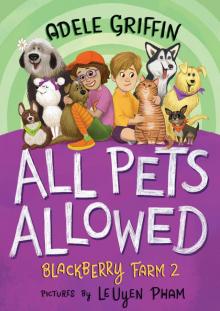 All Pets Allowed
All Pets Allowed Witch Twins Series
Witch Twins Series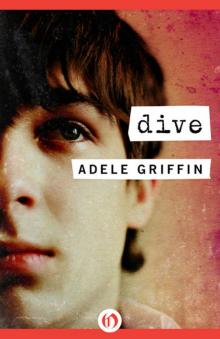 Dive
Dive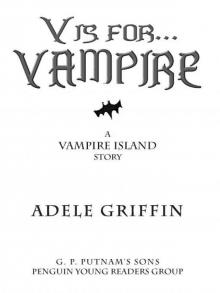 V is for...Vampire
V is for...Vampire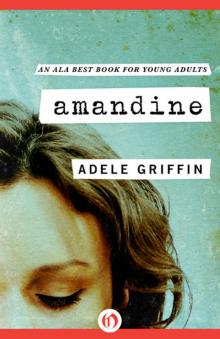 Amandine
Amandine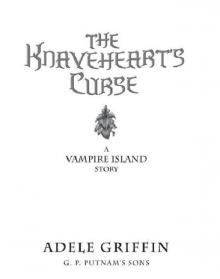 The Knaveheart's Curse
The Knaveheart's Curse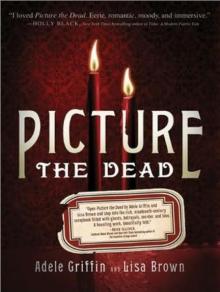 Picture the Dead
Picture the Dead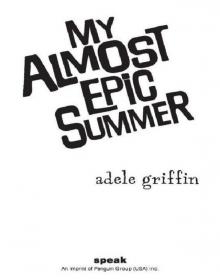 My Almost Epic Summer
My Almost Epic Summer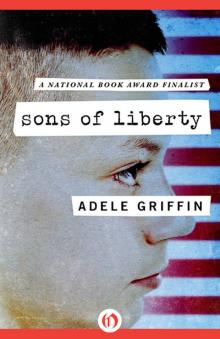 Sons of Liberty
Sons of Liberty Overnight
Overnight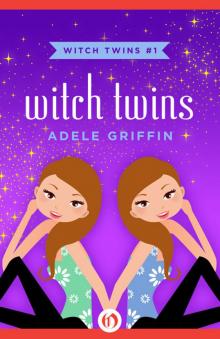 Witch Twins
Witch Twins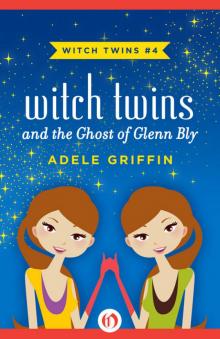 Witch Twins and the Ghost of Glenn Bly
Witch Twins and the Ghost of Glenn Bly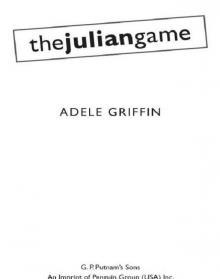 The Julian Game
The Julian Game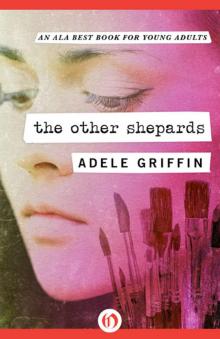 Other Shepards
Other Shepards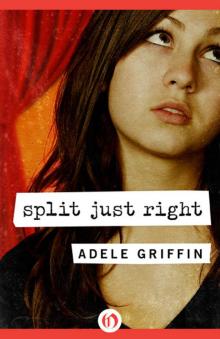 Split Just Right
Split Just Right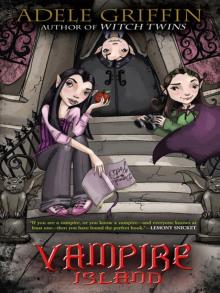 Vampire Island
Vampire Island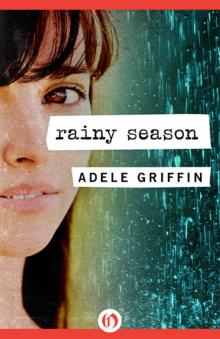 Rainy Season
Rainy Season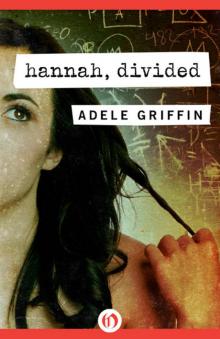 Hannah, Divided
Hannah, Divided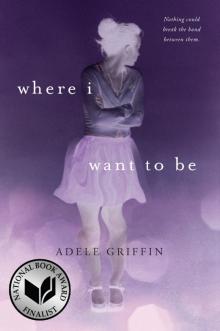 Where I Want to Be
Where I Want to Be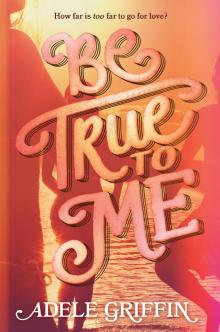 Be True to Me
Be True to Me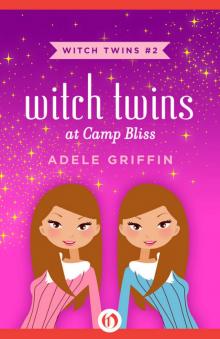 Witch Twins at Camp Bliss
Witch Twins at Camp Bliss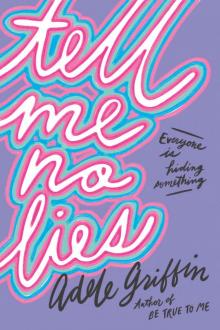 Tell Me No Lies
Tell Me No Lies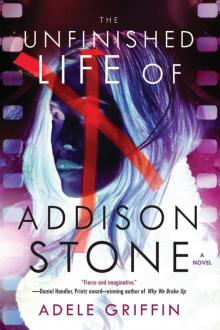 The Unfinished Life of Addison Stone
The Unfinished Life of Addison Stone